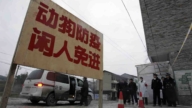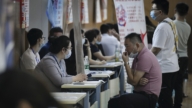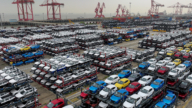【新唐人2012年11月22日讯】媒体报导,在温家宝卸任中共总理之后,新的领导层可能会为实现2020年所要达到的能源目标,而大幅增加新的水电工程项目。水电真如官方所说,是清洁能源吗?这种能源开发方式是否适合中国?请看报导。
中共政府计划在2020年以前把中国的发电能力提高50%,同时削减煤炭消耗,并减少对进口天然气的依赖。“英国广播公司(BBC)”说,面临这样严峻的能源供应挑战,中共新高层除了推动水电工程之外别无选择,因为煤炭发电和核能更难赢得公众支持。
温家宝在任期内曾经亲自阻止一些水电工程的上马,以避免当地民众抗议,BBC引用“中国水力发电工程学会”副秘书长张博庭的话说,温家宝当政期间搁置了许多水电工程项目,2006年至2010年间认定的优先项目中只有三分之一切实施工。
不过官方早已有计划,要在这个十年内对开发水电“下重手”。国家能源局局长张国宝2010年8月就对大陆媒体说,为了达到2020年,非化石能源在一次能源中的比例占15%的目标,其中水电至少要承担9%。
《路透社》援引“厦门大学中国能源经济研究中心”主任林伯强的话说,并不是说水力发电是最好的选择,但这是唯一的选择。
然而,就水电开发问题长久以来官方和民间一直持有两种论调。官方宣传,水电是清洁可再生能源,而且开发技术相对成熟。但学者和环保人士则认为,水电工程伴随大量人口迁移,水土流失,环境破坏等问题,如果考虑生态环境成本,社会成本,和保养整修等,水电是中国最昂贵的能源形式。
四川地矿局教授级的总工程师、水利专家范晓指出,关键在于:中国目前水电开发的模式是“没有选择的”。
水利专家范晓:“所谓没有选择,就是它叫‘全江全流域的梯级开发’,就是他把整个这个自然河流全部变成水库。也就是他要把这个水力发电的资源利用到最大,但是他没有考虑其他方面的问题。因为水资源是一个综合性的资源,它不仅仅是用来发电的,所以不能把整个河流全部都变成一个梯级水库群。从可持续发展、综合协调来看,肯定是有问题的。”
以中国最典型的水电工程“三峡大坝”来看,当大坝蓄水达到设计的最终蓄水位175米时,26台发电机组将全部投入运行,估计每年发电847亿度。“三峡大坝”从2008年开始试验性蓄水,到2010年才实现175米的蓄水目标。
范晓“它现在这个发电法是矛盾的。要发电它一定要把水位蓄到175,最近这两年它是蓄到175了,但是这是以下游的干旱,包括洞庭湖,和鄱阳湖,包括长江中下游的水位,它持续性的,只要是在这个蓄水的时间,都会出现水位急剧的下降,它是以这个为代价的。”
在“三峡水坝”达到蓄水设计的两年,中国最大的淡水湖“鄱阳湖”都在5月出现干涸,第二大淡水湖“洞庭湖”的水位屡创历史最低。两大湖湖心变草原,水产养殖损失严重,渔民生计困难。
大陆民主人士郭永丰:“在中国这样一个体制,这样一个大环境限制下,资源的糟蹋,尤其是环境的污染特别严重。只看眼前不顾长远,养成了一个恶性的循环,是一个环境的灾难。”
北京战略信息分析公司——“安邦集团(ANBOUND GROUP)”的分析人员之前指出,中国的生态环境,并不允许中国在水电开发上直追欧美国家的比例。另有统计显示,中国大陆为数众多的水库存在着极其严重的安全问题,一旦溃坝将造成严重的生命财产损失,和环境破坏。
采访/李莲 编辑/尚燕 后制/葛雷
Hydropower Plans Embarrass CCP’ New Leadership
Recent reports claim that after Wen Jiabao steps down,
the new Chinese Communist Party (CCP) leaders may develop hydropower projects to realize the 2020 energy goal.
Although the CCP insists that hydropower is sustainable,
is this really the case?
Is the current way of energy development
appropriate for China?
According to its 2020’energy goal, the CCP plans
to increase the power generation capacity by 50%.
This will be in conjunction with reducing coal consumption
and lowering the current dependence on imported natural gas.
A BBC report remarked that challenged by such a serious
situation in power supply,
the new CCP leadership has no choice but push forward
the development of hydropower.
Building new plants of coal power or nuclear power
can be even harder to win support from the public.
During Wen Jiabao’s term in office,
he had blocked several hydropower projects.
BBC cited words from Zhang Boting, vice secretary general
of China Society for Hydropower Engineering (CSHE).
Zhang commented that Wen suspended hydropower projects
in the past few years to prevent protests from local residents.
Between 2006 and 2010, only one third of the high priority
projects started actual construction.
However, the CCP had long ago planned to “extensively"
develop hydropower over the next ten years.
Former executive of National Energy Administration
Zhang Guobao spoke with mainland media in August, 2010.
He stated that non-fossil energy is projected to reach 15%
of the total primary energy in 2020,
and the fraction of hydropower should be no less
than 9% at that time.
Reuters’report cited words from Lin Boqiang, chief of China
Center for Energy Economics Research, Xiamen University.
Lin explained that hydropower is not the best choice
for China, but it is the only choice available.
There have been two different opinions on the development
of hydropower -.official and environmental.
The CCP government claims that hydropower is a kind of
sustainable power with mature technology for development.
On the other hand, many scholars and environmentalists
argue that hydropower projects usually lead to soil and water loss, environmental destruction and other problems.
With those ecological, social and maintenance costs
of power stations taken into account, hydropower can be the most expensive power in China.
Chief Engineer of Sichuan Bureau of Geology and mineral
resources, Fan Xiao spoke on the issue.
He believes that the key point is, the CCP’s current model
of hydropower development is “indistinguishable."
Fan Xiao (Hydropower Expert): “The so-called
‘indistinguishable" model refers to the cascaded development over ‘all basins of all rivers.’
The government tries to convert natural rivers into reservoirs
to maximize the available resource of hydropower.
However, such a development model ignored other problems
because the water resource is ‘multifunctional’ and should not be only used to generate power.
You can’t make all the rivers
become simply cascaded reservoirs.
From the view of sustainable development and broader
coordination, there must be something wrong behind that."
Let’s take the most well-known hydropower project
in China, the Three Gorges Dam (TGD), as an example.
The design maximum water level is 175 meters which will
drive all the 26 units of generators at work and provide power-generation capacity of 84.7 TWh per year.
The Three Gorges Dam started to raise it’s water level
in 2008, reaching 175 meters in 2010.
Fan Xiao:"The current model of its power generation
is very problematic.
To generate power it has to keep raising
it’s water level to 175 meters.
Although this was accomplished over the past two years,
it has resulted in droughts of downstream regions, including in the Dongting Lake and the Poyang Lake.
Water levels of all middle and lower reaches of Chang Jiang
continuously drop when the TGD tries to hold the water.
That is the cost of its power generation."
In the past two years when the Three Gorges Dam reached
its designed water level, China’s largest freshwater lake, the Poyang Lake suffered drought problem in May.
China’s second largest freshwater lake,
the Dongting Lake’s water level also hit its historic low.
The central region of these two lakes even became grasslands,
which has caused great loss in aquatic products and greater difficulties in the livelihood of local fishermen.
Guo Yongfeng (Mainland democrat): “Under the CCP’
controlled situation, the waste of resources, especially the pollution problem has become extremely serious.
The vicious cycle of making polices regardless of long-term
benefits has led to disasters of environmental destruction."
Anbound Group analysts, a Beijing-based company of
strategic information analysis, explained that ecologically China cannot develop hydropower like Western countries.
In addition, other statistics revealed
serious safety problems in many of China’s reservoirs.
Once a dam breaks, it will lead to unimaginable loss of lives,
properties, and serious destruction of the environment.





























